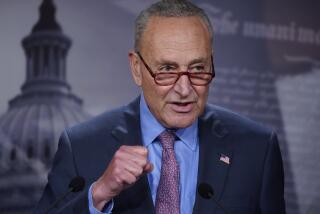Soviet Congress Seeks Reform Constitution
- Share via
MOSCOW — In a manifesto for further reform, the new Soviet national assembly on Saturday outlined a legislative program aimed at accelerating the pace of the Soviet Union’s political, economic and social changes and broadening their scope.
The Congress of People’s Deputies, summing up its first session, called for the drafting of a new constitution, incorporating the dramatic political reforms of the past two years and providing greater protection of individual rights and clearer limits on the authority of the government and the ruling Communist Party.
Key measures include immediate constitutional amendments that “recognize the inalienable rights of the individual to life, freedom, inviolability and security,” a complete judicial reform with the establishment of an independent court system within a year and the adoption of basic laws on freedom of religious belief, of the press and of association.
The congress, noting that the country remains in a deep economic crisis, also demanded a faster pace of economic reform, with decisive steps to move from nearly total state ownership and central planning to a mixed economy operating on the market principles of supply and demand with a strong role for individual entrepreneurs and cooperatives.
And in an effort to resolve the country’s increasingly acute ethnic conflicts, the congress proposed development of a federal structure that would give the 15 constituent Soviet republics real political and economic authority as well as measures that will restore the rights of minorities, such as the Crimean Tatars, Volga Germans and Meskhetian Turks, who were deported from their homes decades ago to remote regions by dictator Josef Stalin.
The deputies called upon the Supreme Soviet, which is now a permanent national legislature, to take urgent action to solve the severe shortages of food and consumer goods, to expand the construction of new housing, to improve education and health care and to raise old-age pensions and payments to families with incomes below the poverty line.
They propose further cuts in the country’s defense budget to finance some of the increased spending as well as greater utilization of the space program in economic development.
Adopted June 9
The resolution, adopted by the new congress at the end of its two-week session June 9 but not published until Saturday, provides the Soviet Union’s basic domestic and foreign policy guidelines--the first time that a national assembly here has laid down such a framework for the government.
The proposals will be put before the 542-member Supreme Soviet, which was elected from among the congress’ 2,250 deputies to function as a full-time legislature, when it reconvenes in Moscow on Monday.
Among the items on the agenda will be the confirmation of Premier Nikolai I. Ryzhkov’s Cabinet. Several nominees, already rejected by commissions that have been examining their qualifications and questioning them about government policies, will face a serious struggle.
Although the reforms begun by President Mikhail S. Gorbachev are now in their fifth year, “the country has not yet emerged from its crisis,” the resolution said, noting that in some respects the problems have grown even more acute.
‘Evolving With Difficulty’
Perestroika , or restructuring, as the reforms are known, “is evolving with difficulty and in a contradictory way, and the state of affairs in the country remains complex and strained,” the resolution said, according to the official Tass news agency.
The deputies said that “cumbersome managerial machinery” is blocking the most basic economic reforms and “is curbing the initiative of the masses.” Problems such as a psychological dependence on orders from above, equal pay for everyone and a social shortsightedness are also hampering the reforms, according to the resolution.
Their solution to these problems is to press ahead with the reforms while trying to minimize the inevitable difficulties.
Calling for a “further deepening of the economic reform,” the congress instructed both the Council of Ministers and the Supreme Soviet to work out a program centered on the “stage-by-stage transition” to a “socialist market,” where supply and demand will supplant the state’s allocation of resources and where private and cooperative firms will compete with state enterprises on the same basis.
Republics to Take the Lead
The first legislative steps should be taken in the coming year, the congress said, with the adoption of laws guaranteeing the rights of such new enterprises, authorizing the leasing of state-owned property to private entrepreneurs wanting to operate their own businesses, shifting state enterprises from a system of “profits delivery” to taxation and permitting constituent republics, starting with Estonia and Lithuania, to take the lead in developing such mixed economies.
Other elements of the economic reform package, certain to prove controversial, include the development of a capital market to manage investments; a program to convert much more of the defense industry to civilian production; a liberalization of foreign trade; the reduction of exports of oil, gas and other raw materials with the expansion of exports of manufactured goods, and making the ruble, the Soviet currency, convertible on international markets on a gradual basis.
In foreign policy, the deputies called for “ensuring the country’s security first of all by political means, the elimination of nuclear weapons through negotiation and the exclusion of the use of force or threat of force to attain any political, economic or other goals.”
Foreign Policy Cited
They also called for reforms in the way that Soviet foreign policy is made so that there is “a reliable procedure capable of fully precluding undemocratic and secret foreign policy decision-making in the future.”
In urging a further improvement in relations with the United States, the deputies said that the Soviet Union must increase its efforts to “bring an end to the arms race.” CHANGE IN HUNGARY Reformer is named Communist Party chairman. Page 10.
More to Read
Sign up for Essential California
The most important California stories and recommendations in your inbox every morning.
You may occasionally receive promotional content from the Los Angeles Times.












